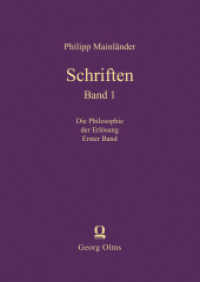- ホーム
- > 洋書
- > 英文書
- > History / World
Full Description
The Reluctant Combatant offers proof that Japanese political leaders were reluctant to engage China in a full-scale conflict during the Second Sino-Japanese War. This book identifies several key aspects of the political context surrounding the Second Sino-Japanese War, including the extreme fragility of the national united front against Japan, the view of Soviet Russia as Japan's principal potential adversary, and the potential threat to Japanese national defense a protracted war with China would pose. This book reveals that the Communists, the National Government, local gentry, peasants, and bandits occasionally collaborated with the enemy—Japanese troops—to expand their spheres of influence.
Contents
PREFACE
INTRODUCTION: INTERNATIONAL POLITICS AND WAR
I. The Second Sino-Japanese War and world history
II. Aggressive wars not considered crimes
III. Japan: victim of circumstance
CHAPTER 1: EVENTS LEADING UP TO THE SECOND SINO-JAPANESE WAR
I. Japan and China join European-oriented international order
II. Russo-Japanese War spawns a new conflict
III. Tension between Japan and China heightens
CHAPTER 2: CHINA AND THE SECOND SINO-JAPANESE WAR
I. Behind the groundswell of support for war against Japan
II. From the Marco Polo Bridge Incident to full-blown war
CHAPTER 3: JAPAN AND THE SECOND SINO-JAPANESE WAR
I. Japan's response to the outbreak of the Second Sino-Japanese War
II. Initial peace overtures
III. The war in the context of international politics
CHAPTER 4: THE SECOND SINO-JAPANESE WAR AND CHINESE SOCIETY
I. Who fought in the war?
II. Recruitment of soldiers in China
CHAPTER 5: WAR DYNAMICS ALTER CHINESE SOCIETY
I. The effect of Japanese occupation
II. Establishment of pro-Japan governments
CHAPTER 6: FROM THE SECOND SINO-JAPANESE WAR TO THE PACIFIC WAR
I. Japanese government's efforts to negotiate peace with Nationalist government
II. The road to the Pacific War
CHAPTER 7: THE CHINESE PERCEPTION OF HISTORY
I. Chinese views about crimes and punishment
II. Confucian ethics encourage lying: the bihui syndrome
AFTERWORD
SELECT BIBLIOGRAPHY








